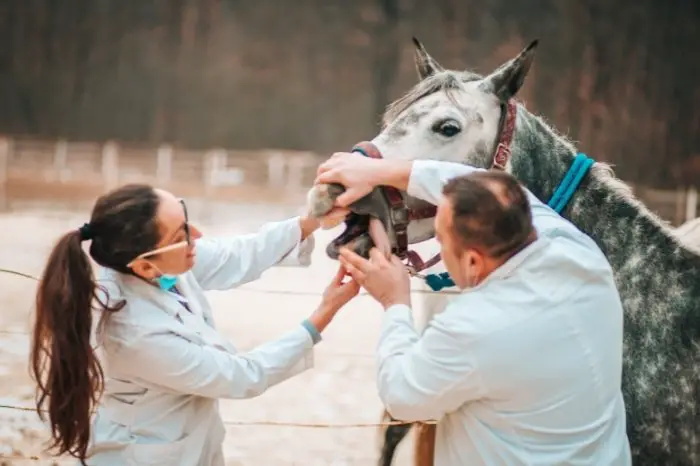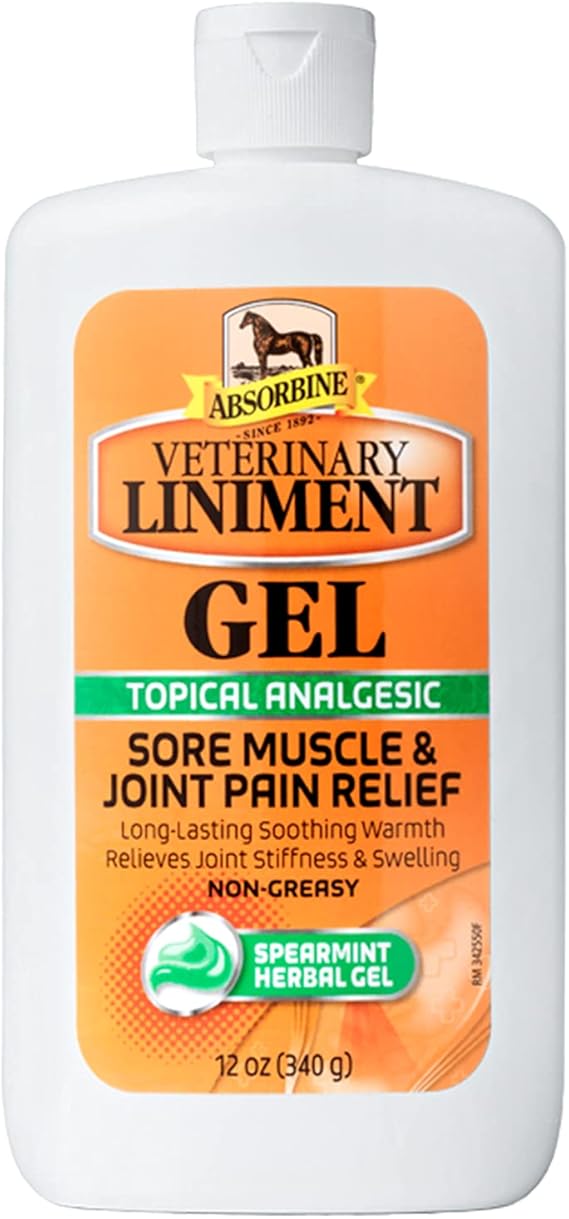Last Updated on April 24, 2022
Whether your horse has a painful problem, or you’re just stocking up your first aid kit, choosing the right painkillers for horses is essential to keep your horse free from pain. However, it is not quite as simple as popping along to the drug store, and it is vital that horses are given the correct drugs at the correct time to prevent pain and suffering. Let’s find out everything you need to know about painkillers for horses!
What Are The Signs Of Pain In Horses?
If you are considering giving your horse painkillers, you firstly need to know how to tell if he is in pain. Horses can find it very difficult to communicate to us that they are in pain, but there are some tell-tale signs that your horse might be feeling pain:
- Changes in Behavior – dullness, depression, aggressive behavior, agitation, head-shaking, reduced interaction.
- Changes to Posture or Movement – arched back, lowered head carriage, reluctant to move, stretching, shifting weight, pawing.
- Appetite Changes – slow eating, reduced food intake, dropping feed, playing with water.
- Facial Expression – tight, pinched mouth, wide nostrils, fixed stare.
If the horse has a specific problem, you will see signs of pain linked to this:
- Colic can cause rolling, flank watching, pawing, stretching, and kicking at the abdomen.
- A lame horse may limp, or refuse to place the affected leg on the floor. It may be reluctant to move or have an altered gait.
- Eye pain will manifest as squinting or holding the eye closed. The horse may also be sensitive to bright light.
- Horses with tooth problems may drop food or be reluctant to eat.
What Is the Best Way To Stop The Pain For Horses
Whatever the reason for the pain, as a horse owner or carer it is your responsibility to help stop the pain. Horse welfare is incredibly important, and is based on a concept called the five freedoms. One of these freedoms is the freedom from pain, injury, and disease.
This means that anyone who cares for a horse has a responsibility to keep them safe from injury, and to provide the appropriate medication if the horse is in pain.
To stop pain, a two-fold approach is needed. Firstly, the initial cause of the pain needs to be removed or resolved, if possible. For example, if the horse has a wound, this should be cleaned, sutured, and bandaged to make the horse more comfortable.
If a horse has a long-term condition that causes pain, it is vital to ensure that all steps are taken to control the disease and keep the horse as comfortable as possible.
Alongside this treatment, painkillers can be used to reduce the level of pain and suffering to the horse. There are a variety of different painkillers used for horses, and they all work in different ways.
Topical painkillers are ones that are applied directly to the skin or injury site, providing localised pain relief. One example of this is a cream that contains local anaesthetic, which will numb the nerve endings and stop pain.
Systemic painkillers are those that are given to the horse either orally, or by injection. Injectable painkillers can either be given into the muscle or the vein, depending on the type used. These types all work by blocking pain pathways – the neurological system that sends signals of pain to the horse’s brain.
Check Out Can You Get A Seal Bay Horse?
How To Get Horse Pain Medication – Painkillers For Horses
One thing that all types of pain medication have in common is that they can only be supplied by a veterinary surgeon. This is because they are prescription-only medications, and can only be used under medical supervision.
Although it may be tempting to give your horse pain medication that has not been prescribed by a vet, this can be a very dangerous thing to do. There are a number of reasons for this.
If given incorrectly, pain medication for horses can cause problems such as kidney disease or gastrointestinal issues. A veterinary professional will take many factors into account, including the age and health status of the horse, before prescribing painkillers.

Painkillers may also mask a problem if used incorrectly, meaning that the correct treatment is delayed. For some conditions, such as colic, eye problems, and lameness, this may mean they never make a full recovery.
Finally, the use of painkillers in horses is tightly controlled to prevent dangerous drugs from entering the human food chain. This is why they are so tightly controlled, and should never be given without the advice and recommendation of your veterinarian.
Summary – Painkillers For Horses
So, as we have learned, there is a wide range of painkillers for horses available, and it is vital to ensure that you use the right one. The best place to get painkillers for horses, plus advice on how to use them, is from your veterinarian. If you suspect your horse is in pain, it is vital to seek expert advice before giving any painkillers.
We’d love to hear your thoughts about painkillers for horses! Have you found that a certain type of painkiller works better for your horse than others? Or perhaps you’re unsure of the best painkiller to use for your horse? Leave a comment below and we’ll get back to you!
FAQ’s

Kate Chalmers is a qualified veterinary nurse who has specialized in horse care for the vast majority of her career. She has been around horses since she was a child, starting out riding ponies and helping out at the local stables before going on to college to study Horse Care & Management. She has backed and trained many horses during her lifetime and competed in various equestrian sports at different levels.
After Kate qualified as a veterinary nurse, she provided nursing care to the patients of a large equine veterinary hospital for many years. She then went on to teach horse care and veterinary nursing at one of the top colleges in the country. This has led to an in-depth knowledge of the care needs of horses and their various medical ailments, as well as a life-long passion for educating horse owners on how to provide the best possible care for their four-legged friends.
Kate Chalmers BSc (Hons) CVN, Dip AVN (Equine) Dip HE CVN EVN VN A1 PGCE

